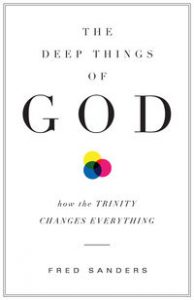The Deep Things of God by Fred Sanders
 Are you intrigued by the Trinity but intimidated about trying to sort it out? Do you feel confused about the subject altogether? The Trinity is an essential doctrine of the church, arguably the essential doctrine of the church. Yet, many Christians traipse through their Christian lives never really profoundly grasping how much the concept that God eternally exists in three persons pervades their existence.
Are you intrigued by the Trinity but intimidated about trying to sort it out? Do you feel confused about the subject altogether? The Trinity is an essential doctrine of the church, arguably the essential doctrine of the church. Yet, many Christians traipse through their Christian lives never really profoundly grasping how much the concept that God eternally exists in three persons pervades their existence.
Fred Sanders is an associate professor of theology at Biola University’s Torrey Honors Institute. He is a first-rate trinitarian scholar, while also an accessible thinker who writes at ScriptoriumDaily.com. His accessible work, The Deep Things of God, is the best introductory work on the Trinity that I have read. What is more, this work is uniquely written to an evangelical audience.
Sanders thesis of this book is simply that evangelicals, whether they recognize it or not, are shaped by the Trinity; they have a tacit understanding of the Trinity. Throughout the rest of the book, Sanders convincingly argues his case, appealing to evangelical scholarship from the last few centuries, including Puritan minds such as Thomas Manton, Thomas Goodwin, John Flavel, Henry Scougal; early evangelicals like Susanna Wesley and John Wesley; others like G. Campbell Morgan, D. L. Moody, and rich engagement in the oft overlooked Fundamental, compiled by R. A. Torrey. Sanders wallops evangelicals with evidence from their own heritage, if anything, helping evangelicals have a little peace of mind that they have a rich tacit Trinitarian heritage to pair with the gospel, bible, and prayer emphasis, which pervades evangelicalism.
Of course, a work like this requires a helpful introduction to the Trinity. Fred Sanders well describes in chapter two the inter-mutual love, dance, and eternal pre-existence of the Father, Son, and Holy Spirit—what many refer to as the immanent Trinity or Trinity ad intra. This he calls “the happy land of the Trinity.” Then in chapter four he fleshes out the details of the “two hands of the Father”, how the Son and the Holy Spirit cooperate in accomplishing and applying redemption. This is simply know as the economic Trinity or Trinity ad extra. The economic Trinity is how we see the Trinity revealed in redemption history.
The Deep Things of God then concludes with a couple chapters that indicate the subtleties of how the Trinity has been emphasized in evangelicals understanding and use of the Bible and Prayer. These two chapters are riveting and Sanders’ research is meticulous.
Three things that I love about this book. First, it helped me tap into my meta understanding of the Trinity. Most evangelicals do not give themselves credit for how intuitively they think upon and account for the Trinity in their spiritual lives. If nothing else, this book will help you feel less guilt-ridden about such things. Second, Sanders calculated writing helped me think through how I might better explain complex concepts such as eternal generation, incarnation, procession, immanent Trinity, and economic Trinity. Third, he made me see how all the silly metaphors for the Trinity: icebergs and eggs—really are no substitute for plainly talking about the Trinity the way God meant for us to talk about himself, in terms of the gospel—The Father sends the Son to save us, the Son accomplishes the saving work through his death and resurrection, and the Holy Spirit applies salvation at our conversion. Simply speaking about what God does helps us see more about who God is.
I give this book a heavy recommendation. It’s unfortunate that I waited so long to read this one. It would have been much help earlier on in my efforts to disciple my children. The Deep Things of God makes you hunger to talk about the Trinity with family, friends, and neighbors.
